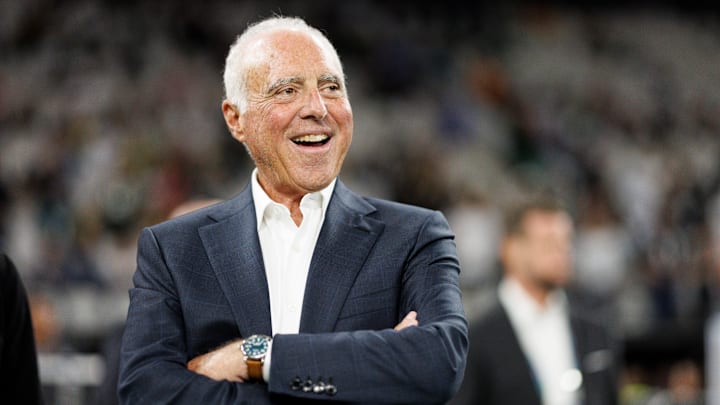Throughout NFL history, coaches have experimented with countless schemes and play designs in an attempt to gain a competitive advantage. Some of them — screen passes, shotgun formations, read-option plays — have become a permanent fixture. Others, like the wildcat formation, proved to be a short-lived trend.
Few, if any, have proven to be as successful as the Philadelphia Eagles’ signature twist on the common quarterback sneak. Commonly referred to as the “Tush Push” or “Brotherly Shove,” the short-yardage play works similarly to a quarterback sneak, except with two teammates pushing the quarterback from behind as he lunges past the line of scrimmage.
Following Philadelphia’s Super Bowl LIX victory, there was a significant push from other teams to ban the play. The Green Bay Packers put forth a proposal to ban the play this offseason, and NFL owners met to determine its fate at the NFL’s spring meetings on Wednesday.
Jeffrey Lurie’s impassioned speech may not have helped Tush Push vote
Before owners submitted their votes, Eagles owner Jeffrey Lurie and future Hall of Fame center Jason Kelce made one final effort to save the controversial play during Wednesday morning’s “Competition and Health & Safety” session, The Athletic’s Diana Russini reported.
Lurie reportedly told the room that his team came up with a play that was so unstoppable that the rest of the league had no other choice but to try to ban it. At the end of the nearly one-hour long impassioned speech, Lurie told the assembled owners that “regardless of the day’s result, he and his franchise would walk out winners, with Super Bowl rings to show for it,” Russini reported.
One high-ranking league official said, “Lurie was like a guy trying to convince his girlfriend why she shouldn’t leave him.”
That may have been enough to push some undecided voters towards banning the play, but the NFL proved capable of being level-headed. The owners ultimately voted against banning the play, although it’s unclear whether Lurie helped sway that result at all.
According to Russini, the Eagles owner emphasized “the need to clean up the process around the play rather than the play itself.” The NFL’s competition committee and health and safety committee recommended banning the play earlier this week, but Lurie noted that there is no data to support the idea of the Eagles’ quarterback sneak being “inherently more dangerous than any other play on the field.”
